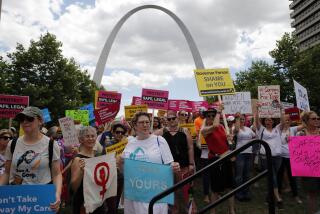Some States May Skip Presidential Primaries
- Share via
ST. LOUIS — At $4.98 a vote, democracy can get pretty expensive.
At least that’s how it looks to some in Missouri, where the budget is in such dire straits that state maintenance workers have unscrewed every third light bulb in government buildings.
The state is poised to push tens of thousands of kids off subsidized health insurance. It may have to eliminate aid payments to the poorest of poor adults. Times are so tight that posters have gone up in government offices everywhere, reminding secretaries to turn off the coffeepots at night, lest they use up a few precious cents’ worth of electricity.
In such an environment, state Rep. David Pearce has decided that voting is a luxury Missourians can’t afford. He has sponsored a bill to cancel the state’s presidential primary.
Holding the election next February would cost at least $3.7 million. In the 2000 primary, barely 19% of registered voters bothered to show up at the polls. Pearce, a Republican, looks at those numbers and concludes: It’s not worth it. “We have a huge deficit,” he said. Abolishing the primary, he added, “just makes sense.”
Apparently, it makes sense to politicians in quite a few other states as well.
Kansas and Arizona are also considering dropping their 2004 presidential primaries. Utah and Colorado already have. In all those states, as in Missouri, the no-vote movement is being led by Republicans, who assume their primary will be about as suspenseful as a cup of vanilla pudding, with President Bush coasting to victory.
Democrats, on the other hand, anticipate an interesting -- or at least somewhat competitive -- race featuring six or eight candidates. So they’re not all that eager to save a few million dollars by shutting down the polls. Especially not in Missouri, where some hope that a good showing might boost the presidential hopes of Richard A. Gephardt, the longtime congressman from St. Louis.
“We have a right to vote, a right to make a difference,” said state Rep. Jim Seigfreid, a Democrat fighting to retain Missouri’s primary.
If the primary were canceled, it would be up to the state political parties to hold caucuses, at their own expense.
In theory, all voters could participate, gathering at a local library or in a rented hall to discuss candidates with their neighbors. In practice, though, caucuses tend to draw far fewer voters than primaries. And with the notable exception of Iowa’s presidential face-off, caucuses tend to draw much less attention from the national media, political pundits and the candidates themselves.
That’s why Arizona Gov. Janet Napolitano, a Democrat, has hinted she will veto a bill to abolish the state’s primary.
Even as Republicans maneuvered to yank $3 million in presidential-primary funding from Arizona’s ailing budget, Napolitano announced last month that the balloting would be held Feb. 3, 2004 -- just one week after New Hampshire’s primary. She promised that an early election would position Arizona to grab the national spotlight -- not to mention a goodly share of campaign dollars.
As she put it: “The TV stations should love me for this.”
Napolitano estimates that campaign spending on food, gas, hotels and advertising will easily pump more than $3 million into the state, enough to pay for the primary. She expects candidates galore to travel the state, along with some “political tourists” -- campaign junkies who spend their vacations trooping to rallies and press conferences for fun.
“Wouldn’t you want to be in Arizona in January and February, rather than in New Hampshire or Des Moines? C’mon, it’s a no-brainer,” said the governor’s spokeswoman, Kris Mayes. “It’s a golden opportunity for Arizona to generate excitement.”
But Bob Fannin, the chairman of the Arizona Republican Party, isn’t so sure that excitement is what Arizona needs. He grumbles that the hullabaloo will distract local lawmakers from doing their jobs.
As proof, he cites a recent visit from Sen. Joseph I. Lieberman, a Democratic presidential hopeful. “The legislative committee work just stopped while he visited with Democratic legislators,” Fannin said, a note of outrage in his voice. OK, so the committees knocked off only an hour or two early that day.
“But multiply that by seven or eight candidates coming through here,” he said, “and the distraction begins.”
More to Read
Get the L.A. Times Politics newsletter
Deeply reported insights into legislation, politics and policy from Sacramento, Washington and beyond. In your inbox twice per week.
You may occasionally receive promotional content from the Los Angeles Times.










